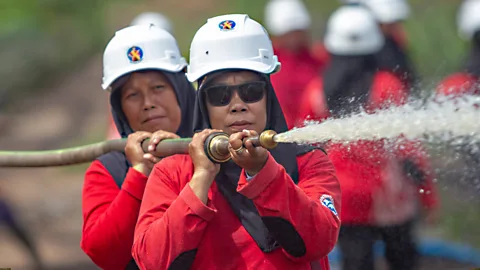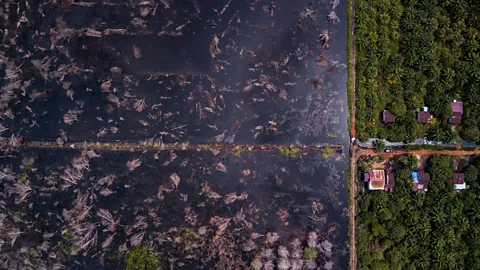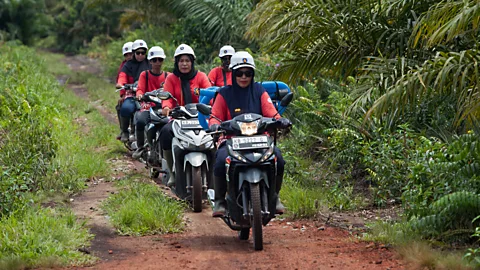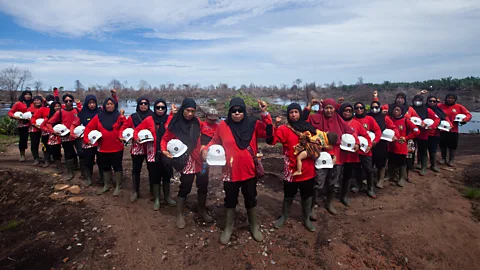The all-women crew fighting Indonesia's peatland fires
 Victor Fidelis Sentosa
Victor Fidelis SentosaFires are a major threat to Borneo's people, forests and wildlife. This all-female crew is combating them while changing attitudes towards women.
In her small, wooden home next to the rainforest, Siti Nuraini applies a homemade sunscreen paste made of rice and finely ground pandan leaf to her face.
"If we don't apply this, the scorching Sun will burn us," she says. Nuraini is getting ready for her patrol duty as a volunteer firefighter in Ketapang district, West Kalimantan, in the Indonesian part of Borneo. Nuraini is the coordinator of the Power of Mama, an all-female firefighting unit established in 2022 to protect the health and livelihoods of the local community and help preserve the environment.
"We experienced fires every year," says Nuraini. "The smoke would get so bad that residents were forced to evacuate and schools had to close. A lot of children suffered from respiratory infections."
The rainforest bordering Nuraini's village, Pematang Gadung, is home to one of Indonesia's largest orangutan populations. It is also a peatland area, making it an important carbon sink. While they make up just 3% of the global land surface, peatlands store twice as much carbon as all the world's forests. Over the past century, an increased demand for forestry and agricultural land has led to the drainage of peatlands worldwide.
This article in the Climate Guardians series was supported by funding from the European Journalism Centre, through the Solutions Journalism Accelerator. This fund is supported by the Bill & Melinda Gates Foundation.
Indonesia is home to the most carbon-dense peatlands in the world. The majority of these peatlands have been severely degraded to fuel the world's demand for oil palm, a common household ingredient. (Read more about the everyday ingredient that harms the climate.)
Once they are drained and dry, peatlands are more susceptible to severe wildfires, which pose a major risk to the wildlife, people and biodiversity living in the surrounding region.
Pematang Gadung is located between two peatland areas, spanning 70 sq km (27 sq miles). Every year during the dry season, the residents of the village face a renewed threat.
"The fires here often start in degraded peat areas that can't hold water anymore," says Nuraini.
When the Power of Mama firefighting group was established in 2022, 44 women volunteered. The group now has 92 members from six local villages, with ages ranging from 19 to 60. Most of the members are housewives, but younger working women have joined the unit recently too.
Nuraini has been up since dawn, cooking rice and tidying up the house. At 09.30, she heads into the forest on her motorbike, along with six other women. She is wearing a brown hijab with long sleeves emblazoned with the words "The Power of Mama" and knee-length rubber shoes.
It is the rainy season so, for now, there are fewer fires. The Mamas are on patrol duty, visiting farmers who grow beans, bananas, chillies, cabbage and pumpkins. These farmers practise slash-and-burn agriculture, where forest cover and other vegetation is chopped down and burned to clear the land for cultivation. The farming method is allowed by the local government, as long as it takes place in an area spanning less than 20,000 sq m (215,217 sq ft).
Heavy losses
Between 2001 and 2022, Ketapang district lost 879,000 hectares of tree cover, resulting in 588 million tonnes of CO2 emissions, according to Global Forest Watch data. A total of 1,340 sq km (517 sq miles), 15% of total tree cover, were lost due to fires, equivalent to 80% of the area of Greater London. According to data from Indonesia's Ministry of Environment and Forestry, wildfires during January-July 2023 resulted in 9.6 million tonnes of CO2 equivalent (CO2e).
The Power of Mama work closely with the village authorities to identify which farmers are clearing their land by setting fires and encourage them to keep burning land under control by practising indigenous fire management, which is associated with promoting ecological diversity and protecting communities from increasingly severe fires.
The Power of Mama are also helping farmers boost the productivity of their land by encouraging them to use organic fertiliser to bring nitrogen back into the soil and enhance crop growth, instead of relying on slash-and-burn agriculture.
"These practices not only protect our environment but also ensure the long-term viability of farming while mitigating the impacts of climate change," says Nuraini.
Sixty-year-old Juriah, the oldest Power of Mama member, says the women are encouraging farmers to manage their land "like people did in ancient times".
"The goal is to keep peat soil from becoming acidic," she says, adding that farmers can use a mixture of brown sugar, pineapple, shrimp paste, bran and tapioca to fertilise their crops.
 Victor Fidelis Sentosa
Victor Fidelis SentosaDuring the dry season, the fire risk is higher, so the Mamas patrol every day to make sure that potential blazes are detected as early as possible. They often receive reports from other villagers who increasingly believe in the Mamas' work to protect the environment. Sometimes these reports lead them to areas that are difficult to access, and the Mamas must use wooden canoes to reach the fires or drones to get a better view.
When they encounter a fire, Nuraini instructs the other Mamas to pick up hoses and start pumping water to extinguish the blaze.
At noon, the women have a simple lunch at Nuraini's home. They then continue patrolling until 15.30.
Sign up to Future Earth
Sign up to the Future Earth newsletter to get essential climate news and hopeful developments in your inbox every Tuesday from Carl Nasman. This email is currently available to non-UK readers. In the UK? Sign up for newsletters here.
The Power of Mama unit was established by the Indonesian Nature Rehabilitation Initiation Foundation (YIARI), the Indonesian affiliate of environmental non-profit International Animal Rescue.
YIARI's director Karmele Llano Sanchez decided to create Borneo's first all-women firefighting squad after a local farmer set a fire to clear a tract of land. YIARI staff asked the man to extinguish the fire, but he ignored them. The same thing happened when they asked local authorities to intervene.
"But then we told his wife who then later told him off, and he put out the fire," Sanchez says.
This experience highlighted that women can help change communities' attitudes towards fire prevention, she says.
 Victor Fidelis Sentosa
Victor Fidelis SentosaYIARI trains the Power of Mama members to fight fires, operate drones and deliver public talks raising awareness about the dangers of peatland fires.
It is not easy to be a volunteer firefighter in a peatland area, says Sanchez. Peatland fires can be difficult to detect as they occur underground and therefore are not always immediately visible.
There are also serious health risks as the women are exposed to a lot of smoke and could get stuck in a burning area, says Sanchez. To avoid these dangers, women wear protective masks and are taught how to spray the water hoses from a safe distance, she says.
To date, there have been no fatalities. However, some of the women have sustained injuries, particularly when they've fallen from their motorbikes while driving over rough terrain, says Nurraini.
"The rainy season brings its own set of challenges: the Power of Mama adapt by patrolling in boats, traversing the flooded areas," says Sanchez.
Women play a key role in boosting environmental awareness in their community, says Leli Khairnur, a women's rights and environmental activist from West Kalimantan.
"Especially in rural areas, women are key actors in the success of programmes at the community level. This is because women are the primary beneficiaries, so a sense of ownership of a programme is the basis for their involvement. In other words, executing a programme well is essential to help themselves," says Leli.
Nuraini says the women were initially ridiculed when they joined the Power of Mama.
"We were laughed at for wearing uniforms and joining patrols," she recalls. "The men in the village would mock us and say things like: 'Women patrolling? Seriously?' Why would women patrol, don't you have better things to do?'"
 Victor Fidelis Sentosa
Victor Fidelis SentosaJuriah also had an unpleasant experience. While fighting a fire last year, a farmer falsely accused her of stealing pineapples. Upset, she left the farm. However, when the fire returned to the same area, the villagers, struggling with an insufficient village water pump, called on Juriah for help. "I went to his field with a water pumping machine. He felt ashamed," she says.
The residents who used to mock the Mamas now invite them to village meetings, says Sanchez. "It's hard to change behaviour, but small changes at the village level are a good start," she says. "For a long time, women were overlooked. But now, everyone realises that they play an important role in society."
Carbon count
The emissions from travel it took to report this story were 140kg CO2. The digital emissions from this story are an estimated 1.2g to 3.6g CO2 per page view. Find out more about how we calculated this figure here.
Zakaria, the head of financial affairs for the nearby Sungai Besar village, describes the Mamas as "local heroes and important actors in the community". Due to the Mamas' close collaboration with village authorities there were no fires in the village last year, he says.
In November 2023, the Power of Mamas received Indonesia's Clean Air Championship Award 2023 for their work in ensuring clean air for local communities.
Nuraini says her involvement with the Power of Mama has taught her more than just firefighting. "I have learned a lot about the environment, about protecting animals and combatting things that can disrupt the forest or river ecosystem. Things that we learned at school, but this time it is much more detailed," she says. "I have a five-year-old daughter, and I am now teaching her about animals and how to care for nature."
For Sanchez, it's not only about fighting fires. "It's about seeing these women become more confident and play a role in their society," she says.
--
If you liked this story, sign up for The Essential List newsletter – a handpicked selection of features, videos and can't-miss news delivered to your inbox every Friday.
